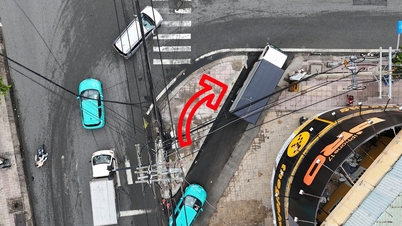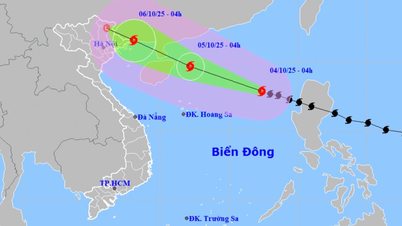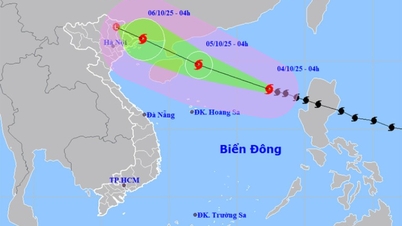Vocational training – from a job “ticket” to integration luggage
For decades, vocational training was considered a “secondary” choice compared to university. Many parents and students assumed that university was the door to change their lives, while vocational training was only for those with average academic performance or those who did not meet the entrance exam requirements. This perception caused Vietnam’s vocational training system to fall into a difficult situation, with many vocational schools operating at a standstill or even closing due to lack of enrollment. However, the picture of the labor market in the new decade has completely changed.

According to statistics, currently up to 70% of job demand is concentrated in the group of mid-skilled workers - those with solid practical skills, able to operate machinery, repair equipment, and manufacture products. Meanwhile, the supply is scarce. This paradox makes many businesses complain that they cannot recruit technical workers and skilled workers, while tens of thousands of bachelors and masters are still unemployed or doing work that is not in their field of expertise.
That shows that vocational training is no longer a “backup path” but has become a proactive, wise choice for those who want to quickly enter the labor market. Learning a solid profession, workers not only have stable jobs but also open up opportunities to start their own businesses, build small businesses or become sought-after experts.
Career Values in Times of Change
In the context of the Industrial Revolution 4.0, the concept of a career is not limited to “doing a specific job” but is also associated with the ability to adapt and retrain. An electrician can learn more skills about green energy; a mechanic can be trained to operate robots; a tailor can switch to designing and creating high-end fashion products for the international market.
The most important thing about vocational training is practicality. There is no need for lengthy theory; learners are directly exposed to machines, materials, and production processes. Each hour of study is an hour of practicing skills. This is what makes the difference: vocational skills can be immediately verified by the products and services produced, not just on the diploma.

The value of a profession also lies in its sustainability. While some “hot” professions are easy to rise but also fade quickly, crafts, technical professions, and essential service professions always exist with society. A good auto mechanic will always have customers, a talented chef will always find a place, a highly skilled medical technician will always be needed by the community. A profession is not only a source of income, but also a source of pride, a “certificate” of the worker.
Moreover, modern society has changed the way of looking at things, skilled workers can earn many times more than office graduates. In fact, many skilled workers in the fields of construction, mechanics, electricity, electronics, beauty, and cuisine are earning from 20-40 million VND/month, or even more, thanks to the scarcity of high-quality human resources. The value of a career, therefore, is not only a means of making a living but also a legitimate path to becoming rich.
Investing in vocational training – investing in the future
When the Government and international organizations warn that up to 45 million Vietnamese workers need to be retrained, it is not only a personal issue but also a matter of economic survival. Without a skilled workforce, Vietnam will find it difficult to take advantage of opportunities from foreign investment flows, to participate deeply in the global value chain, and to build a society that develops based on knowledge and innovation.
Investing in vocational training is therefore investing in the future of the nation. Vocational schools need to be upgraded, their programs modernized, and closely linked with businesses to train according to real needs. Workers need to be supported with tuition fees and encouraged to learn throughout their lives, so that whenever the market changes, they can update their skills.
In particular, it is necessary to change social perceptions: vocational training is not a “narrow path” but a parallel path to university, with no less value and potential. Vocational training must be promoted as a prestigious choice, because behind every quality product, every sustainable project, are the hands and minds of skilled workers.
In an era where knowledge and practical skills determine the survival of each individual, vocational training is not only personal but also closely linked to the development of society. A solid career is a “passport” for workers to integrate, affirm their values, and build a sustainable future for themselves and for the country.
Source: https://baolaocai.vn/hoc-nghe-gia-tri-ben-vung-cua-lao-dong-trong-ky-nguyen-moi-post879979.html


![[Photo] Prime Minister Pham Minh Chinh chairs meeting to deploy overcoming consequences of storm No. 10](https://vphoto.vietnam.vn/thumb/1200x675/vietnam/resource/IMAGE/2025/10/3/544f420dcc844463898fcbef46247d16)
![[Infographic] Notable numbers after 3 months of "reorganizing the country"](https://vphoto.vietnam.vn/thumb/1200x675/vietnam/resource/IMAGE/2025/10/4/ce8bb72c722348e09e942d04f0dd9729)



![[Photo] Students of Binh Minh Primary School enjoy the full moon festival, receiving the joys of childhood](https://vphoto.vietnam.vn/thumb/1200x675/vietnam/resource/IMAGE/2025/10/3/8cf8abef22fe4471be400a818912cb85)






































































![[Infographic] Notable numbers after 3 months of "reorganizing the country"](https://vphoto.vietnam.vn/thumb/402x226/vietnam/resource/IMAGE/2025/10/4/ce8bb72c722348e09e942d04f0dd9729)































Comment (0)